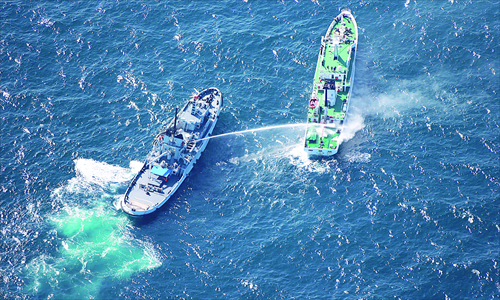PLA navy simulates East China Sea clash

China's naval force Friday held a joint exercise with the country's marine surveillance and fishery management authorities in the East China Sea, where tensions between China and Japan have mounted over Tokyo's "nationalization" of the Diaoyu Islands.
A total of 11 vessels, eight aircraft and more than 1,000 people from the East Sea Fleet of the People's Liberation Army (PLA) navy and regional bureaus of fishery management and oceanic administrations took part in the exercise.
The one-day exercise was aimed at improving coordination between the navy and administrative patrol vessels, as well as sharpening their response to emergencies during missions to safeguard territorial sovereignty and maritime interests, the Xinhua News Agency reported.
Xinhua said that when carrying out missions in disputed waters, patrol vessels of the fishery administration and marine surveillance agency have been stalked, harassed and even intentionally interfered with by foreign vessels, posing challenges to the completion of their duties.
The exercise simulated a scenario in which Chinese marine surveillance and fishery management patrol vessels were obstructed by and clashed with foreign patrol ships during law enforcement missions in Chinese waters. The "clash" led to damage to Chinese vessels, and some of the crew members aboard the ships were injured and fell into the sea. The East Sea Fleet then sent frigates, hospital ships, tugboats, fighters as well as helicopters to back up and shield the vessels and provide emergency aid.
TV footage from China Central Television Friday showed images of several vessels and helicopters carrying out the drill.
A military source close to the exercise, who requested anonymity, told the Global Times that the exercise wrapped up on Friday morning, but didn't reveal the specific area.
According to the source, it was the largest-ever joint exercise held by the navy, fishery and marine surveillance agencies.
"Law enforcement vessels are closer to the front lines when it comes to safeguarding China's maritime rights and interests. But those ships are almost unarmed. Obstructions by foreign vessels would pose great challenges for them," he said, adding that such joint drills would be made routine in the future.
"We, the naval force, are the strong backing for maritime law enforcement forces. And we have been keeping close ties with them," Shen Hao, director general of the exercise and deputy chief of staff of the East Sea Fleet, told China Radio International Friday.
The exercise was the third of its kind. The PLA Daily said it was held in accordance with the annual plan.
Luo Yuan, a major general at the PLA Academy of Military Sciences, told the Global Times Friday that though the exercise had been planned out beforehand, it clearly showed China's resolute will to defend its sovereignty over the Diaoyu Islands and their adjacent waters in the wake of Japan's unilateral move over the islets.
"We have gradually gained the initiative in the waters off the islets, shifting from passively defending to active law enforcement in the area," said Luo. "Such exercises could effectively deter those who dare infringe upon our maritime rights."
Japanese Chief Cabinet Secretary Osamu Fujimura Friday said that Tokyo had few details on the drill, AFP reported.
"We decline to comment on the drill, but we will continue monitoring various Chinese moves," he said.
Japan has been increasingly wary of Chinese vessels' presence in the waters off the Diaoyu Islands.
Japan's Fuji TV Tuesday said that a number of Chinese navy vessels were navigating toward the Diaoyu Islands on Tuesday morning. The report quoted Japanese Defense Minister Satoshi Morimoto as saying that Japan had dispatched surveillance aircraft to follow the Chinese fleet.
In response, China's Ministry of Defense said its navy vessels' activities around the Diaoyu Islands were legitimate, condemning the presence of Japanese military aircraft there, Xinhua reported.
According to Japan's NHK news service, since Japan "purchased" the islets in September, the number of emergency takeoffs by Air Self-Defense Force jets against Chinese aircraft has sharply increased.
Meanwhile, Japan's Nippon Foundation said Friday it has decided to abolish a program that promotes defense exchanges between Japanese and Chinese field officers amid the current rows, Kyodo News reported.
The foundation said it decided to scrap the program after receiving a request from its Chinese counterpart on Monday to postpone this year's visit of its delegation to Japan.
The program, started in 2001, had more than 300 officers from the two countries pay reciprocal visits.
Agencies contributed to this story